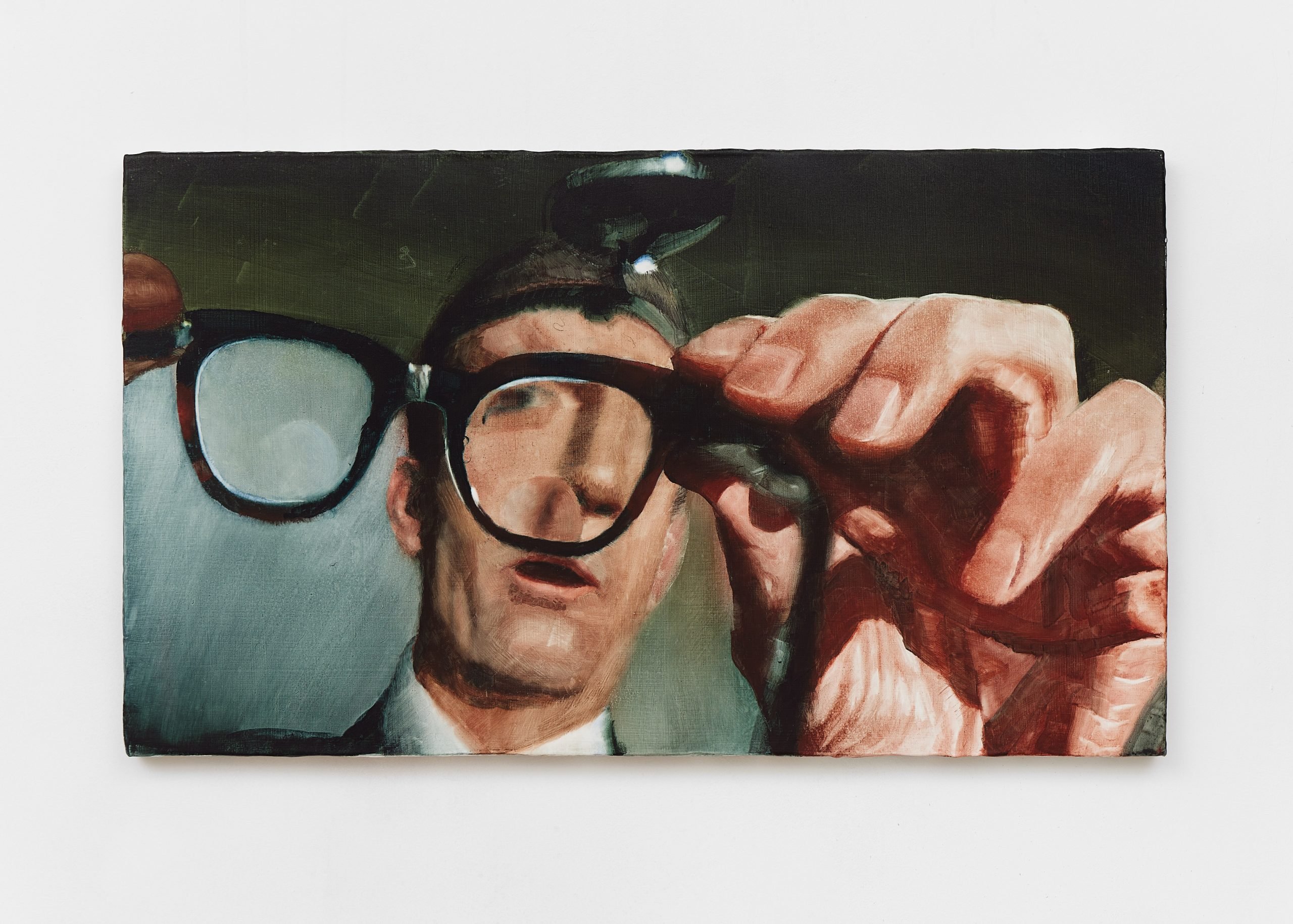
By the time Joseph Yaeger starts painting, he’s been working on a piece for months. He’s chosen a reference image, often a still from a film. He’s layered gesso on canvas, maybe scraped or pockmarked the canvas with water, or the hind end of a brush. Then, and only then, will he start to paint.
“The prep takes quite a bit longer than the painting,” Yaeger said. “I don’t sit and deliberate on a canvas for very long.” Once he gets going, most of his paintings are at least close to being finished in one to five days.
The resulting pictures are textured, with a glossy sheen and striking color marks along the sides of the canvas on which they rest. At first look, they’re easy to mistake for oils, but are in fact watercolors. Yaeger is “happily married” to watercolor, and “constantly discovering new ways to make it lie.”
“The way that watercolor is thought of, both culturally and in the history of painting, it seems like it’s a wide-open field,” Yaeger said. “And there’s so much more that can be done with it.”
Joseph Yaeger, Inside a time are its lies (2022). Courtesy of the artist and Project Native Informant, London.
Born in 1986 in Montana, Yaeger spent a year at film school in his home state, but his love of cinema didn’t translate into studying it formally. Nonetheless, cinema to this day “foregrounds, and backgrounds, and middle-grounds” his artistic practice, he said.
Having graduated with a BFA in painting from the Rhode Island School of Design in 2008, Yaeger moved to London with his then-girlfriend, now wife, in 2010. He wrote, and worked as a cheesemonger for six years before pursuing an MA at the Royal College of Art, which he completed in 2019. It was at the degree show for that course that Project Native Informant (PNI), the gallery that now represents Joseph, came across his work.
Solo shows with the gallery followed, first online (“The Writer” in 2020) then at PNI’s East London home (“Doublespeak” in 2021). Yaeger also exhibited his work at a solo show in Shanghai last year, and in group exhibitions in Los Angeles and New York. Another solo show is set to take place at Project Native Informant in September, coinciding with Frieze London.
The painter’s subjects are often intimate: close crops of hands, mouths, and feet. But eyes, and seeing, hold particular sway in his work. In “Time Weft,” a solo exhibition of new work currently showing at the Perimeter, a gallery with a small permanent collection in London, many pieces treat seeing itself as a central concern. Some show faces half-obscured by glass or shadow. In one canvas, a woman’s eyes are covered by a hand; in another, a man examines a pair of bifocals.
Joseph Yaeger, Old long since (2022). Courtesy of the artist and Project Native Informant, London.
These subjects speak to Yaeger’s interest in recasting existing or familiar images. He cites the artist Luc Tuymans, who also paints from film stills, as an influence, though their methods differ.
“I just realized that he had taken up all the space there was in that room. There’s no more oxygen for me in the room of painting a screen, because it’s thoroughly been done,” Yaeger said.
“A lot of the solution to that problem for me was, where is there room in mediated imagery, and how can one think of it in a different way than these people who were much more about one-to-one,” he said. Part of the solution was a turn toward sensuality: a glistening lip, or the sheen of a forehead. “There has to be this reanimation of a necessarily dead thing,” Yaeger said.
Installation view: Joseph Yaeger at Project Native Informant’s booth at Art Basel Miami Beach 2021. Courtesy of Project Native Informant.
“Time Weft” has been well attended, and could be a stepping stone to bigger things.
“It is Joseph’s biggest show to date” says Jeremy Parker, a director at Project Native Informant. “There’s definitely institutions that are starting to be interested in acquisition of his work.”
“That’s kind of what you hope for,” when an artist has a show like “Time Weft,” Parker added, that it “leads to more opportunities in the public space.”
Private collectors, too, are showing interest.
“We have a lot of demand for his work now from serious collectors and international foundations,” said Rory Mitchell, director at Ocula Art advisory in London, which has previously placed Yaeger’s work with buyers. “Some of our bigger clients are looking at his work now and considering it.”
Joseph Yaeger, Each one is two (2022). Courtesy of the artist and Project Native Informant, London.
For Yaeger, though, work itself remains the focus.
“If I were painting for interest, for the increased collectorship, for people to desire to buy a thing that I smeared on a canvas, I think it would be really, really hamstringing,” Yaeger said. “If I overhear somebody talking about me… I will run away and plug my ears.”
“I would say that it feels really, really good that it seems like there is a lot of interest right now, but I would say equally the only solution to that problem is to get back to work and to get into the studio,” he said.
“Time Weft” is on view at the Perimeter, 20 Brownlow Mews, London, through February 18.